Are you considering installing a metal roof but unsure about how much it will cost? Look no further! In this article, we will break down the factors that influence the cost of a metal roof, giving you a clear idea of how to budget for this home improvement project. From the type of metal used to the size and complexity of your roof, we will discuss it all to ensure you make an informed decision and plan your finances accordingly. Say goodbye to the guessing game and let’s dive into the details of budgeting for a metal roof!
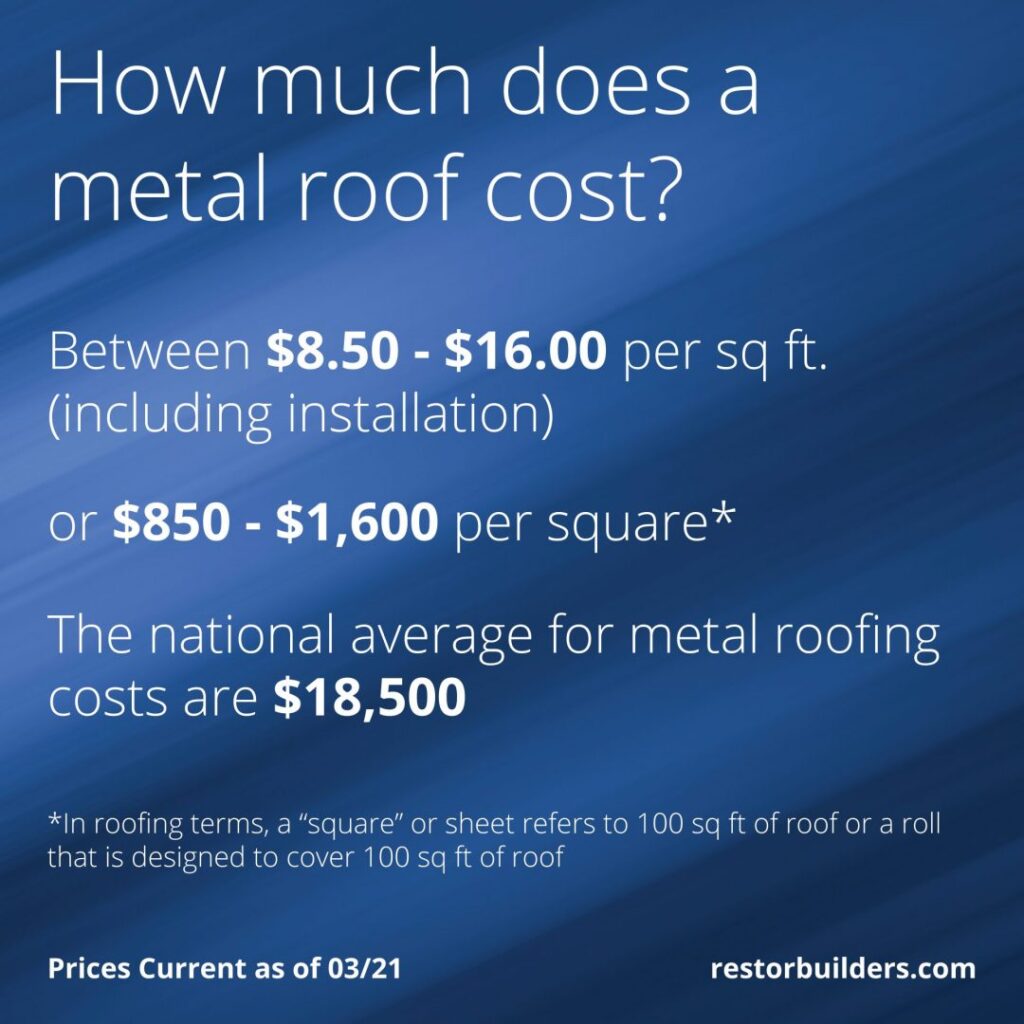
Factors to Consider
Size of the Roof
The size of your roof is one of the key factors that will influence the cost of installing a metal roof. Larger roofs require more materials and more labor, which will increase the overall cost. It’s important to accurately measure the square footage of your roof before obtaining any quotes or estimates.
Roofing Material
Another important consideration is the type of metal roofing material you choose. There are various options available, each with its own price point. While some materials may be more affordable, others can be more durable and long-lasting. It’s important to consider your budget and prioritize factors such as longevity and appearance when selecting your roofing material.
Complexity of the Design
The complexity of your roof’s design will also impact the cost. If your roof has multiple angles, dormers, or unique architectural features, the installation process might require more labor and expertise. These additional complexities can increase the overall cost of your metal roof installation.
Roof Pitch
The pitch or slope of your roof is another factor that can affect the cost of installation. Steeper roofs require additional safety precautions and may require specialized equipment, which can increase labor costs. Additionally, a higher roof pitch can make the installation process more challenging and time-consuming, leading to higher costs.
Accessibility
The accessibility of your roof is an important factor to consider. If your roof is easily accessible for workers and materials, the installation process can be more efficient, reducing labor costs. However, if your roof is difficult to access due to its height or location, additional equipment and precautions may be necessary, resulting in increased costs.
Location
Your location can also impact the cost of installing a metal roof. Factors such as local labor rates, material availability, and even the climate can affect the overall cost. Roofing prices can vary significantly across different regions, so it’s important to research and consider the local cost factors when budgeting for a metal roof.
Labor Costs
Labor costs will make up a significant portion of the overall cost of installing a metal roof. The complexity of the installation, the size of the crew required, and the level of expertise needed can all impact labor costs. It’s important to choose a reputable roofing company that has experience with metal roof installations to ensure a high-quality and efficient installation.
Permits and Inspections
Depending on your location, you may need to obtain permits and undergo inspections during the installation process. These additional steps can add to the overall cost of the project. It’s important to check with your local authorities and budget for any required permits and inspections when planning for a metal roof installation.
Additional Features
If you have additional features on your roof, such as chimneys, skylights, or vents, these factors should be taken into account when budgeting for a metal roof. These features may require additional labor and materials during the installation process, increasing the overall cost. It’s important to communicate these details to the roofing company when obtaining quotes.
Warranty and Maintenance
While not a direct cost factor, it’s important to consider the warranty and maintenance requirements of the metal roofing material you choose. Higher-quality materials may come with longer warranties but can also have higher upfront costs. Additionally, regular maintenance and inspections are essential to extend the lifespan of your metal roof, so these ongoing costs should also be factored into your budget.
Average Cost of Metal Roofing
Type of Metal Roofing
The type of metal roofing you choose will greatly impact the average cost of your installation. There are several options available, including steel, aluminum, copper, zinc, tin, galvalume, and galvanized steel. Each material has its own price range based on factors such as durability, appearance, and availability. It’s important to research and compare the different options to find the best fit for your budget and needs.
Square Footage
The square footage of your roof is a crucial factor in determining the overall cost of a metal roof installation. The larger the roof, the more materials and labor will be required, leading to higher costs. It’s important to measure your roof accurately to obtain accurate quotes and estimates from roofing contractors.
Cost per Square Foot
The cost per square foot of metal roofing can vary depending on the material and any additional features or customization. On average, the cost per square foot ranges from $8 to $15, excluding installation. However, higher-end materials and more complex designs can significantly increase this price range. It’s important to discuss pricing details with roofing contractors to get an accurate estimate for your particular project.
Total Cost
To determine the total cost of your metal roof installation, you’ll need to multiply the square footage of your roof by the cost per square foot for the chosen material. For example, if your roof measures 2,500 square feet and the cost per square foot is $10, your total cost would be $25,000. It’s important to factor in additional expenses such as labor, permits, and any customization or additional features to get a complete picture of the total project cost.
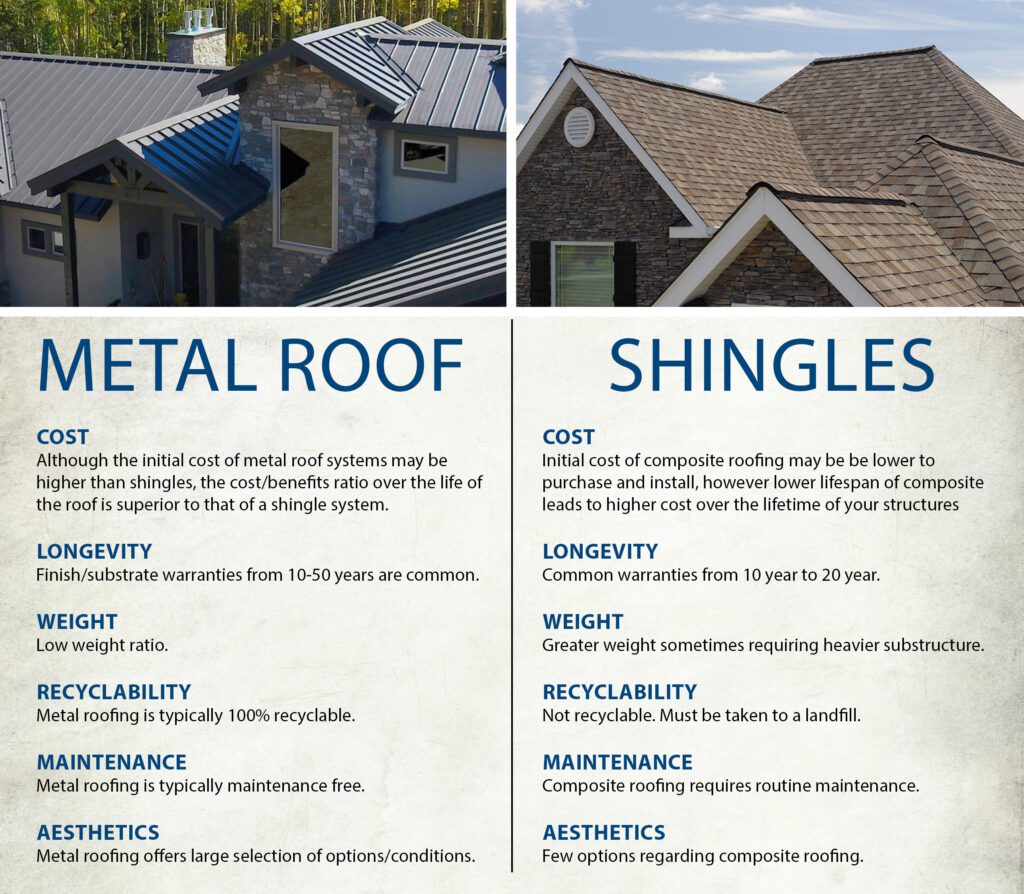
Cost Breakdown
Material Costs
The material costs of a metal roof installation will depend on the type of metal roofing chosen. Each material has its own price range per square foot, which will be multiplied by the square footage of your roof to determine the material costs. It’s important to consider the durability, maintenance requirements, and longevity of the chosen material to ensure it fits within your budget and suits your needs.
Installation Costs
Installation costs include the labor required to install the metal roof, as well as any additional equipment or tools needed. The complexity of the installation, the size of the crew required, and the level of expertise needed can all impact installation costs. It’s important to obtain multiple quotes from reputable roofing contractors to ensure you are getting a fair price for installation.
Additional Expenses
Additional expenses can include permits, inspections, and any customization or additional features you choose for your metal roof. Permit and inspection fees will vary depending on your location and the specific requirements in your area. Customization and additional features such as skylights or chimneys will also add to the overall cost of your metal roof installation. It’s important to discuss these details with your roofing contractor to get an accurate estimate for your project.
Unexpected Costs
It’s always important to budget for unexpected costs that may arise during the installation process. For example, if damage or structural issues are discovered once the old roofing is removed, repairs or additional work may be required, leading to higher costs. It’s a good idea to set aside a portion of your budget for any unforeseen expenses that may arise.
Determining Factors
Size and Complexity
The size and complexity of your roof are important determining factors in the cost of a metal roof installation. Larger roofs require more materials and labor, while complex designs may require additional expertise and time to install. These factors can increase the overall cost of the project.
Choice of Material
The choice of material will greatly influence the cost of a metal roof installation. Different materials have different price ranges, with some being more affordable than others. It’s important to consider your budget, as well as factors such as durability, appearance, and maintenance requirements, when choosing the material for your metal roof.
Labor Costs
Labor costs are a significant factor in determining the overall cost of a metal roof installation. The complexity of the installation and the level of expertise required can impact labor costs. It’s important to choose a reputable roofing company with experience in metal roof installations to ensure a high-quality installation that meets your budget.
Roofing Company
The roofing company you choose can also impact the overall cost of your metal roof installation. Different contractors may have different pricing structures and levels of experience. It’s important to obtain multiple quotes and thoroughly research the reputation and credentials of any potential roofing contractors before making a decision.
Location
Your location can influence the cost of a metal roof installation. Factors such as local labor rates, material availability, and climate can all impact pricing. It’s important to consider these local factors when budgeting for a metal roof installation and obtain quotes from local contractors to get an accurate estimate.
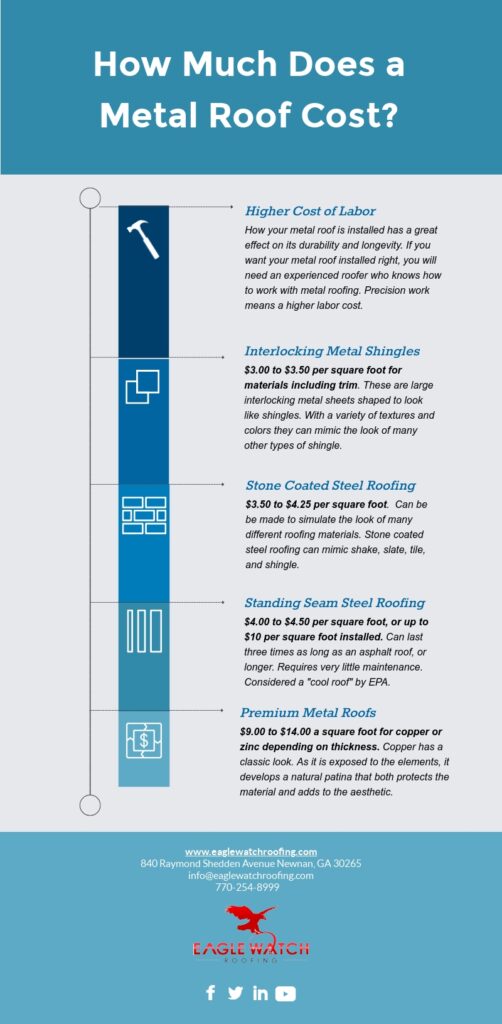
Material Options
Steel
Steel is a popular choice for metal roofing due to its durability and affordability. It is resistant to corrosion and can withstand harsh weather conditions. It is available in a variety of colors and finishes, making it a versatile option for different architectural styles.
Aluminum
Aluminum is another commonly used material for metal roofing. It is lightweight, durable, and resistant to corrosion. Aluminum roofs are available in a range of styles and colors, making them a popular choice for both residential and commercial buildings.
Copper
Copper roofing is known for its distinctive appearance and natural patina that develops over time. While copper is a more expensive option, it offers excellent durability and longevity. Copper roofs are often chosen for their aesthetic appeal and can add a unique touch to any building.
Zinc
Zinc roofing is highly durable and offers excellent resistance to corrosion. It has a distinct blue-gray appearance that can complement a variety of architectural styles. Zinc roofs are known for their longevity and low maintenance requirements.
Tin
Tin roofing is a traditional option that offers durability and resistance to corrosion. It is often chosen for its nostalgic charm and is commonly seen on historic buildings. Tin roofs can be customized with various patterns and designs.
Galvalume
Galvalume is a combination of steel and aluminum, offering the best qualities of both materials. It provides excellent corrosion resistance and durability. Galvalume roofs are a popular choice for areas with harsh weather conditions.
Galvanized Steel
Galvanized steel is coated with zinc to enhance its corrosion resistance. It is a cost-effective option that provides durability and longevity. Galvanized steel roofs are commonly used in residential and commercial buildings.
Installation Process
Removing Old Roofing
Before the installation of a new metal roof, any existing roofing materials need to be removed. This involves stripping away the old shingles or other materials down to the roof deck. Proper removal and disposal of old roofing materials are important to ensure a clean and stable base for the metal roof.
Roofing Preparation
Once the old roofing is removed, the roof deck needs to be inspected and prepared for the installation of the metal roof. This may involve repairing or replacing damaged areas, ensuring proper ventilation, and applying any necessary underlayment or insulation.
Roofing Installation
The actual installation of the metal roof involves laying down the metal panels or shingles according to the manufacturer’s instructions. This process requires precision and attention to detail to ensure a watertight and aesthetically pleasing result. Each panel or shingle is secured to the roof deck using appropriate fasteners.
Finishing Touches
After the metal roof is installed, finishing touches may include the installation of flashings, gutters, and downspouts. These elements help to further protect the roof and direct water away from the building. Proper installation of these details is crucial to ensure the long-term performance and durability of the metal roof.
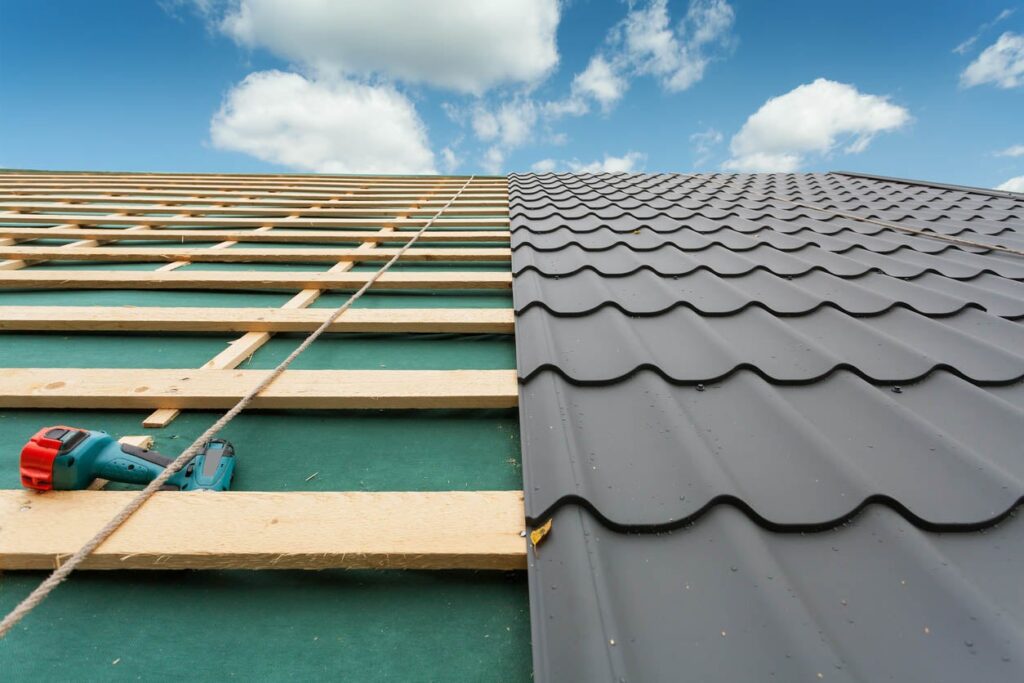
Cost-Saving Tips
Roofing Material
One way to save on the overall cost of a metal roof installation is to choose a more affordable material. Steel and aluminum are generally more cost-effective options compared to copper or zinc. It’s important to consider your budget and prioritize factors such as durability and aesthetics when selecting a material.
DIY vs. Hiring Professionals
While it may be tempting to consider a DIY metal roof installation to save money, it’s important to weigh the potential risks and challenges. Metal roofing requires specialized knowledge and equipment, and a professional installation ensures the best results. Improper installation can lead to leaks and other issues down the line, which can be more costly to fix. Therefore, it’s generally recommended to hire professionals for a metal roof installation.
Comparing Multiple Quotes
Obtaining multiple quotes from reputable roofing contractors is an important step in finding the best price for your metal roof installation. It’s important to compare not only the overall cost but also the quality of materials, experience of the company, and warranties offered. This will help you make an informed decision while considering your budget.
Off-Season Installations
Consider scheduling your metal roof installation during the off-season. The demand for roofing services tends to be lower during certain times of the year, which can lead to lower prices and faster scheduling. Roofing companies may also offer discounts or promotions during slower periods to attract customers.
Maintenance and Repairs
Regular maintenance and prompt repairs are essential to extend the lifespan of your metal roof and prevent costly damage. By keeping your roof in good condition, you can avoid more extensive repairs or premature replacement. It’s important to budget for regular maintenance and address any issues promptly to save on long-term costs.
Factors That Can Increase Costs
Complex Roof Design
If your roof has multiple angles, dormers, or other architectural features, the installation process can be more complex and time-consuming. This increased complexity can lead to higher labor costs and potentially higher material costs as well.
Multiple Chimneys or Vents
Additional features such as chimneys, vents, or skylights can add to the overall cost of a metal roof installation. These features require additional labor and materials to properly integrate into the roof system. It’s important to communicate these details to the roofing contractor to obtain an accurate estimate.
Roofing Accessibility Issues
Roofs that are difficult to access due to height, steepness, or other factors can increase the overall cost of installation. Additional safety measures and equipment may be necessary, leading to higher labor costs. It’s important to discuss any accessibility issues with the roofing contractor to ensure accurate pricing.
Unforeseen Structural Problems
During the installation process, unforeseen structural issues may be discovered. This can include rotting wood, weakened trusses, or other damage that needs to be addressed before installing the metal roof. These repairs or additional work can increase the overall cost of the project.
Additional Features
Any customization or additional features added to your metal roof, such as snow guards, solar panels, or advanced insulation, will increase the overall cost of the installation. It’s important to consider these additional costs when budgeting for your metal roof.
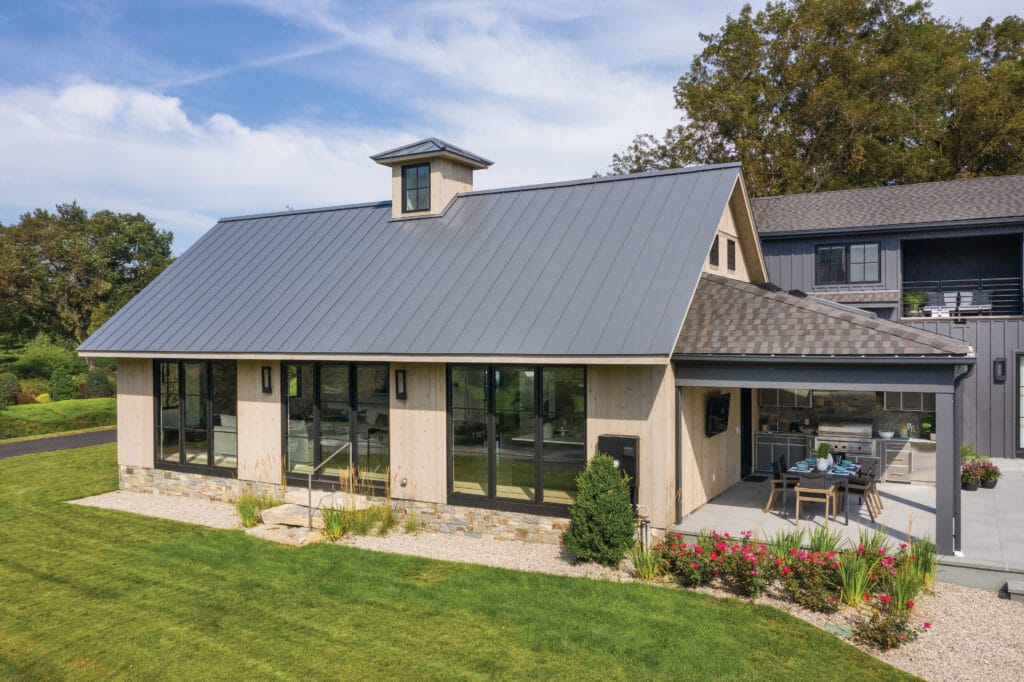
Budgeting Tips
Research and Comparisons
Before budgeting for a metal roof installation, it’s important to research the various options available and gather information about the average costs in your area. Additionally, obtaining multiple quotes from reputable roofing contractors will help you compare prices and find the best option for your budget.
Determining Your Affordability
Consider your financial situation and determine how much you can afford to allocate towards a metal roof installation. It’s important to be realistic and set a budget within your means. Consider other financial commitments and prioritize your roofing project accordingly.
Setting a Realistic Budget
Once you have determined your affordability, set a realistic budget for your metal roof installation. Account for all the factors mentioned earlier, such as size, material, labor costs, permits, and any additional features or customization. Setting a comprehensive budget will help guide your decision-making and ensure that you can afford the project.
Consider Financing Options
If your budget doesn’t align with the estimated cost of the metal roof installation, consider exploring financing options. Some roofing companies may offer financing plans or there may be other financing options available through banks or lending institutions. It’s important to carefully review any financing agreements and understand the terms and interest rates before making a decision.
Getting Multiple Quotes
Finding Reputable Roofing Contractors
Start by researching and identifying reputable roofing contractors in your area. Read customer reviews, check their certifications and licenses if applicable, and ensure they have experience with metal roof installations. It’s important to choose a contractor with a solid reputation and a track record of delivering high-quality work.
Evaluating Quotes
Obtain quotes from multiple reputable roofing contractors and carefully evaluate each one. Compare not only the overall cost but also factors such as the quality of materials, experience of the company, and any warranties offered. Consider the reputation and reliability of each contractor, as well as their ability to meet your specific needs and budget.
Discussing Specifics
Once you have narrowed down your choices, discuss the specifics of your project with each roofing contractor. This includes providing accurate measurements, discussing the type of metal roofing material you prefer, and any additional features or customization you are considering. Be sure to address any concerns or questions you may have during these discussions to ensure a clear understanding of the project scope and costs.
Choosing the Best Option
After obtaining multiple quotes and discussing the project specifics with each contractor, carefully consider all the information. Compare the quotes, the reputation and experience of each contractor, and your overall gut feeling about each option. Choose the roofing contractor that offers the best combination of quality, affordability, and expertise to ensure a successful metal roof installation.